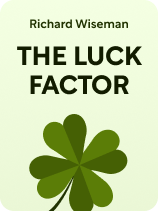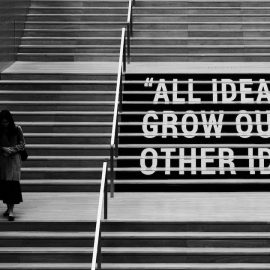

This article is an excerpt from the Shortform book guide to "The Luck Factor" by Richard Wiseman. Shortform has the world's best summaries and analyses of books you should be reading.
Like this article? Sign up for a free trial here.
Is luck real? What do science and psychology say? Is it possible to improve your luck?
In his book, The Luck Factor, psychologist Richard Wiseman conducted extensive research on people who claim to have good or bad luck. Wiseman explores the science behind luck and how you can improve yours by deliberately applying the unconscious methods that lucky people use.
Keep reading to learn how people create their own luck, how to turn bad luck into good luck, and more.
Overview of The Luck Factor
What is luck? Does it even exist? We all have moments in our lives that we think of as lucky or unlucky, but are they all the result of random chance, or is luck an actual force that shapes our lives? The scientific answer may surprise you—psychologist Richard Wiseman conducted extensive research on individuals who consciously think of themselves as having good or bad luck, and he discovered that luck isn’t purely random. Instead, without knowing it, lucky people behave in specific ways that create good fortune, while people who think of themselves as unlucky subconsciously do the reverse.
In The Luck Factor, published in 2003, Wiseman explores the science behind luck and how to improve your fortune, whether in your work or your personal life. He explains how his research uncovered the unconscious methods that lucky people use to create the semblance of good fortune, and he argues that by deliberately applying these methods, you can make your own luck and use it to shape your life.
Wiseman is a psychology professor at the University of Hertfordshire in Hatfield, UK. His focus on unusual phenomena such as luck began before his professional career with his childhood fascination with magicians and illusionists. As a scientist, Wiseman is known for studying and disproving alleged “paranormal” incidents and powers, but his research into the nature of luck led him to conclude that it’s very real—albeit, entirely psychological.
In this guide, we’ll cover the results of Wiseman’s research on how people with good and bad luck create the luck that governs their lives. We’ll break it down into four major factors—believing in your luck, trusting intuition, seizing opportunities, and turning bad luck into good. Lastly, we’ll cover Wiseman’s practical advice for applying these principles of good luck in your life and potentially becoming a luckier person.
We’ll also contrast Wiseman’s views with those of psychologists and productivity experts who approach his concepts from different angles. We’ll suggest readings that expand on some of Wiseman’s points, as well as practical ways to apply Wiseman’s advice.
In Search of Luck
The first step in performing a scientific study is to define the question being asked. In his research, Wiseman’s underlying question was “Is luck purely random, and if not, what causes it?” Wiseman details the myriad ways luck shows up in our individual lives and in the wider world, as well as why he considers it a subject worthy of study.
Many of us credit luck—good or bad—for the random occurrences that shape our lives. An accidental swerve of your steering wheel can mean the difference between being in a tragic accident or, by chance, avoiding one. A spur-of-the-moment decision as to where you eat dinner could lead to an encounter with your future spouse, whose path you might otherwise never have crossed. A random selection of lottery numbers can mean the difference between unexpected wealth and another night of poring over gloomy finances. Wiseman asks whether these events are truly random or if some people live blessed—or cursed—lives.
Wiseman cites numerous examples where lucky circumstances have affected the realms of technology and business. Many scientific breakthroughs have been made by seemingly random chance, such as when astronomer William Herschel chanced upon the planet Uranus while surveying a small patch of the sky with his telescope. Through luck, entrepreneurs have stumbled on new inventions when chance revealed unintended applications for products other than what their designers intended—such as when Spencer Silver accidentally invented the “sticky note” when he failed to produce a high-powered adhesive, resulting in a much weaker one instead.
At first glance, it appears that many things we take for granted came about because of luck—or did they? Wiseman points out that despite the impact of random chance on our lives, little scientific research has been conducted on the subject of luck, since it’s hard to measure and quantify chance events. However, Wiseman didn’t see this as a barrier, but a challenge. His early research revealed that nearly two-thirds of his test participants identified as having consistent good or bad luck, contradicting the notion that luck is purely random and hinting that other factors might be at play. Wiseman proposes that understanding those factors could lead to ways of improving your luck, assuming those factors are under your control.
How Luck Works
The first thing that Wiseman makes clear is that too many people have had repeated good or bad luck in their lives for all their experiences to be random or imagined. Therefore, as a psychologist, he approaches the problem in terms of belief and behavior. What he’s found in his research is that people who identify as having good or bad luck tend to act in ways that produce results that confirm their expectations.
Wiseman also investigated what other factors might determine someone’s luck. For instance, he administered intelligence tests to self-identified lucky and unlucky study participants, but he found no correlation between being smart and being lucky. Likewise, he tested whether some form of psychic ability played a role in luck by recruiting lucky and unlucky test subjects to predict lottery numbers. In this case, he found that in a truly random scenario, people who think they’re lucky do no better than anyone else. Nevertheless, the “lucky” participants had higher expectations of winning, and while optimism didn’t improve their odds, Wiseman believes that such expectations could influence their lives in other positive ways.
Establishing a scientific basis for luck is good news for everyone because in science, results are reproducible. Wiseman suggests that by consciously adopting the attitudes and behaviors of lucky people, we can all improve our chances in life, at least in those areas that our thoughts and actions can impact. In contrast, unlucky people rarely have positive experiences, make poor decisions, don’t reach their goals, and buckle under setbacks—all because they actively believe the world is out to get them. Study after study has shown that thoughts and behaviors determine how we experience the world, and reframing your outlook can measurably improve your life. Wiseman says it improves your luck as well.
Wiseman identifies four main psychological factors that lucky people unknowingly engage to increase their chances of success and satisfaction—they believe that life will work out in their favor, they follow their instincts, they grab opportunities, and they turn any setbacks into platforms for growth.
Factor 1: Believing in Luck
The first psychological characteristic that defines both lucky and unlucky people is that they believe they’re lucky or unlucky. Put another way, some people look to the future favorably, while others see only doom and gloom. Whichever side of the line you fall on, you probably attribute your beliefs to past experience without realizing the degree to which your expectations shape your experience. Wiseman writes that a positive outlook—feeling “lucky”—energizes how you tackle the future in ways that a negative outlook cannot.
Playing the Numbers
Wiseman notes that people who feel lucky don’t see luck as a one-time occurrence. For instance, if they make a new friend at a sporting event by striking up a conversation with a stranger, they’ll tend to repeat that behavior in the future, expecting a similar outcome and statistically raising the chances of one. Wiseman finds that this type of positive belief is so ingrained in lucky people that even when their hopes aren’t met, they view it as a temporary glitch. Conversely, people who feel they’re unlucky expect something bad to follow anything good—if they meet one friendly person, they expect the next one to be a jerk. Therefore, they won’t seek to recreate a past success, preventing any possible good luck in the future.
Another point to consider is that people who believe in their own luck are more persistent than those who think that luck is against them. Wiseman’s research shows that self-proclaimed lucky people are more likely to enter competitions, spend more time trying to solve difficult problems, and pursue challenging career opportunities. Their belief in their luck makes them lucky in the sense that it gives them more time and opportunities to succeed. On the other hand, people who expect disappointment will actively minimize their chances for success by avoiding situations in which they might lose, from poetry contests to job interviews. The cumulative effect of persistence—or its lack—will self-confirm your beliefs about your luck.
Networking for Luck
Wiseman’s final point about believing in your luck is that people who expect lucky outcomes in life tend to be more positive when they interact with others. As a result, others are more positive in return, increasing your chances of making new friends, networking with your peers, and making lucky connections that can enhance your life. For instance, suppose your roof starts to leak. If you’re a lucky-minded person, you’re more likely to connect and be open with many people, raising the odds of meeting someone who knows a roofer willing to give a discount to their friends. Your belief in luck makes having luck more likely, which will only reinforce your beliefs and create more opportunities for random chance to turn in your favor.
Factor 2: Trusting Your Feelings
The next commonality that Wiseman discovered is that people who think of themselves as lucky tend to trust their intuition more than those who don’t. As a result, they enhance their luck by making, on average, better decisions—both in their personal and professional lives—and are more likely to engage in activities that improve their intuitive skills.
Wiseman says there’s nothing magical about intuition and gut feelings. Rather, hunches and instincts are often the result of your brain’s unconscious pattern recognition skills. A great deal of psychological research has shown that our unconscious minds influence our choices, and our brains developed to work that way for a reason. Intuitive hunches are one way that our brains streamline the decision-making process, and Wiseman’s research found that unlucky people often ignore the warning signals their intuition sends them, whereas people who seem to have luck on their side are more willing to follow their instincts.
Wiseman cites numerous case studies demonstrating that people who follow their hunches fare better in personal relationships, career choices, and financial decisions. For instance, if you meet someone on a blind date, you may immediately feel an energetic connection—or you might feel that something’s “off” about the person. The same scenario may come up during a job interview—you might get a positive feeling about the other person, or something in the back of your mind might tell you that they’re not someone you want to work with. When following these hunches leads to a good decision, you might attribute your outcomes to luck when in fact your unconscious was just doing its job.
Intuition Is a Muscle
Unconscious intuition—like any other skill—requires exercise and practice to grow stronger. In his research, Wiseman discovered that in addition to using their intuition more frequently, lucky people actively take steps to enhance their intuition, whether they realize it or not. They do this by practicing meditation, finding quiet places for contemplation, and regularly clearing their minds in other ways to boost their intuitive skills. In surveys, these individuals report how these techniques have improved their decision-making abilities and overall luck in various aspects of their lives. Therefore, Wiseman concludes that lucky people treat their intuition as a valuable tool and make a point of fostering and listening to their feelings.
Factor 3: Seizing Lucky Moments
The third factor Wiseman identifies is that lucky people recognize potentially lucky moments and immediately take action when they happen. Once again, this form of luck isn’t magic, but rather stems from certain people’s psychological makeup—they tend to be extroverts who are open to new experiences.
Wiseman writes that extroverts, by their nature, meet many people and put energy into maintaining long-term relationships. The extensive social network an extrovert creates dramatically increases their chances of beneficial chance meetings and connections. Therefore, if you’re looking for a job, a romantic partner, or just a good plumber to work on your house, and you have a wide network of connections, your odds are much higher of “lucking into” someone who can help you. The more contacts you have, the better your odds—extroverts create luck through simple mathematics.
Relaxing Into Luck
However large your circle, you have to be open to grabbing chances when they come, and a relaxed approach to life can help with that. Wiseman’s research shows that lucky people tend to have a relaxed attitude and an openness to new experiences. People with lower anxiety are more likely to view chance occurrences with less suspicion, seeing them as opportunities instead of dangers. Likewise, people who seek out new experiences expose themselves to a broader range of opportunities than people who stay in safe, familiar patterns. In short, lucky people’s relaxed approach to life lets them capitalize on opportunities that others overlook. Being “lucky” in this sense simply means staying open to the world around you.
Factor 4: Reversing Your Luck
Despite the strategies listed above, luck is still largely a matter of chance, so why don’t “lucky people” have as much bad luck as good? The secret is that they do—but Wiseman points out that people who identify as lucky turn their bad luck around by recasting it in a positive light. They achieve this via several techniques such as reframing situations, avoiding rumination, and taking precautions to prevent bad luck from repeating itself in the future.
Seeing bad luck in a good light isn’t easy, but Wiseman explains that many of his “lucky” research subjects make a habit of imagining how the bad things that happen could have been even worse. For example, suppose you get really sick just before a big convention you’d looked forward to attending. Though anyone would be understandably upset, a lucky-minded person might imagine how much worse it would have been to get sick right before the vacation they’d planned for one month later instead. Wiseman argues that this type of perspective helps lucky people maintain a more positive outlook even on unpleasant experiences.
Another trait Wiseman discovered is that lucky people let go of past misfortunes and focus on the future. As stated before, lucky people tend to have faith that circumstances will generally get better over time, whereas many psychological studies have shown that ruminating on the past can create a downward spiral of negative emotions and memories. By keeping an eye on the long-term future, many of the lucky people in Wiseman’s research attributed unexpected benefits to the seemingly unfortunate events in their lives. For instance, a flat tire might make you late for work, but it could also lead to meeting a good mechanic who you come to rely on for maintenance and repairs.
Bad Luck Is a Teacher
The last commonality that Wiseman uncovered was that lucky people view any bad luck as a learning opportunity. Instead of giving up when something bad happens, a lucky-minded person will ask why things went wrong and what they can do to improve their odds in similar situations. For example, you might ask why your tire blew out—had you gone too long without having it checked? Lucky people’s proactive approach to bad luck helps them minimize the chances of experiencing it again and often leads to creative solutions to the problems caused by their current misfortune. On the other hand, Wiseman finds that unlucky people tend to chalk their bad luck up to sheer chance and don’t make as much of an effort to prevent it.
How to Be Lucky
Now that we’ve established the life strategies and personal traits that make lucky people lucky, the question becomes, “Can they be replicated?” Wiseman says they can if you incorporate strategies to improve your luck into your daily attitudes and routines. Throughout his recommendations, Wiseman emphasizes the power of your expectations to shape your reality. He says to experiment with different techniques, since different methods may work better for different people. The overall goal is to cultivate a more positive and expectant outlook on life, which—fingers crossed—might bring you good luck.
Brighten Your Outlook
To get the ball rolling on developing a positive attitude toward the future, Wiseman says to set realistic but ambitious goals for the short, medium, and long term. Achieving short-term goals will give you a boost toward your next rung on the ladder, and if “bad luck” gets in the way, you can turn short-term misfortune into a way to practice perseverance. Wiseman suggests that when faced with a setback, you can engage in lucky-minded thinking by weighing the cost of trying again—whether to double-down on your bet on yourself—against the benefits of your eventual success. You’ll often find that your short-term bad luck is tiny compared to the rewards of long-term persistence.
In addition to cultivating the belief that luck will eventually turn your way, Wiseman writes that you should adopt practices to boost your intuition. Since Wiseman’s research shows that lucky people often do so by engaging in meditation, finding quiet places, or taking breaks from problems to clear their minds, he suggests trying whichever of these methods appeal to you the most and observe the effects. Keep in mind these activities don’t produce immediate results—they require patience and become more effective with regular practice.
Broaden Your Horizon
In addition to suggesting you adopt a forward-thinking perspective, Wiseman recommends taking concrete steps to increase your chances of lucky moments and encounters. The first is to build a larger personal network, like those of the lucky people in his study. One way is to deliberately initiate conversations with several strangers each week, whether in line at the grocery store, at meetings for work, or during social gatherings. You can also reconnect with people with whom you’ve fallen out of touch, if only to have a brief catch-up conversation. Most interactions won’t turn into strong connections, but the more you interact with other people, the more likely you are to luckily stumble into a valuable new contact or future lifelong friend.
Wiseman says that along with enlarging your social network, you should emulate lucky people by increasing your range of experiences. Every new interest, hobby, and aspect of life you explore increases your chances of lucky encounters that might benefit your career, your personal life, or open a window to opportunities you’d never considered. If you’re not sure where to start, Wiseman suggests that you literally roll the dice: Write a list of six things you’ve never tried and randomly roll for which one you’ll pursue. Make expanding your life into a game, and approach it with a child-like perspective, free from expectations. That openness, Wiseman insists, is vital to spotting lucky moments when they happen.
Turn Your Luck Around
The last and most difficult new skill to learn is to not think of “bad luck” as bad luck at all. When things are going bad, “look on the bright side” might be the last thing you want to hear, but Wiseman insists that’s what lucky people do. To more easily adopt a positive perspective, he suggests you take time to picture different ways your supposed bad luck might have saved you from something worse. For instance, you might imagine that your last flat tire saved you from being in a traffic accident a few minutes later due to a drunk driver. You should also imagine how bad luck in the past may have led to a positive chain of events. For example, bad luck during one job interview might open the door to a different, better position later.
Likewise, Wiseman agrees that you shouldn’t dwell on your prior bad fortune. Instead, if you find yourself ruminating on the past, distract yourself with activities like exercise, watching funny movies, listening to music, and spending time with friends. If you can’t avoid thinking about the past, you should reminisce about positive events, reminding yourself of the good luck you’ve had to counter any recent bad luck you may be feeling. These activities shift your focus away from negative experiences, painting a more balanced portrait of your life—one in which your so-called “bad luck” doesn’t loom as large as it may at first seem.
Rule Your Luck—Don’t Let It Rule You
While Wiseman shows that belief in good luck is overwhelmingly positive, belief in bad luck is destructive because it makes you feel helpless to control your circumstances. Therefore, his final recommendation is to take charge of your life when bad luck strikes. Whatever misfortunes arise because of “luck,” you should immediately brainstorm solutions, decide on a course of action to take, and implement your solution right away. Instead of blaming external factors, focus on what you can learn and do differently whenever bad luck swings your way. If you can change and grow in some way as part of dealing with your misfortune, then perhaps your luck wasn’t as bad as you believed.
Exercise: Do You Feel Lucky?
Wiseman writes that people who seem especially lucky are those who believe in their good luck and unconsciously act in self-beneficial ways. They trust their instincts, take advantage of opportunities, and find ways to turn their bad luck into good. Think about how these traits show up in your life.
- Do you think of yourself as lucky or unlucky? Why or why not?
- Have you ever followed a lucky hunch that turned out to be right? If so, what was it? Conversely, have you ever had a hunch that you wish you’d followed, but didn’t?
- What’s the last unlucky thing that happened in your life? Can you see a silver lining in the way things turned out, and if so, what is it?
- If someone could guarantee you’d have good luck in the next thing you attempted, what would you do? Is there any reason not to do it anyway?

———End of Preview———
Like what you just read? Read the rest of the world's best book summary and analysis of Richard Wiseman's "The Luck Factor" at Shortform.
Here's what you'll find in our full The Luck Factor summary:
- The unconscious methods lucky people use
- The benefits of trusting your intuitive hunches
- The scientific explanation as to whether or not luck is real






